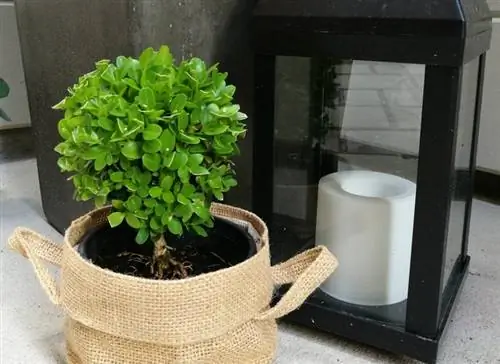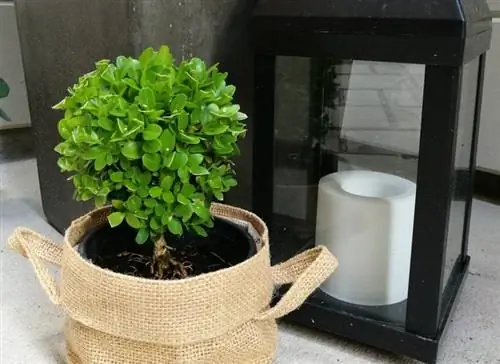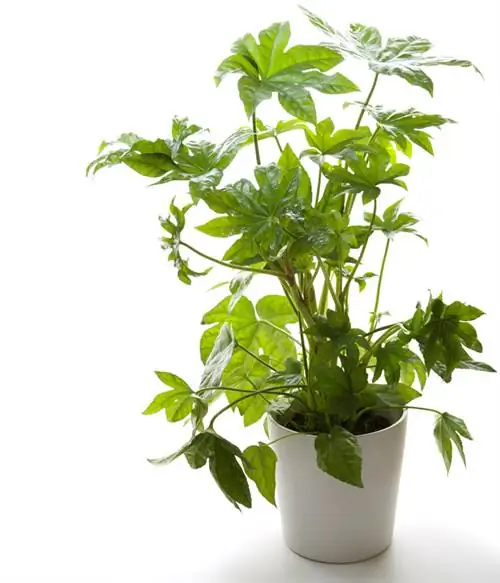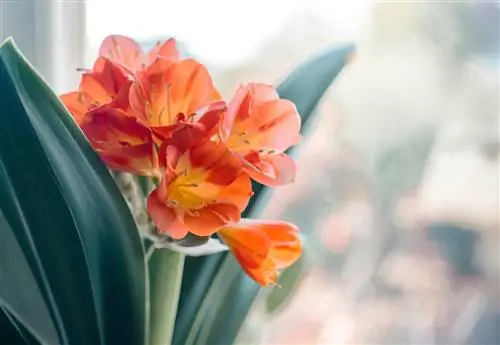- Author admin leonars@hobbygardeners.com.
- Public 2023-12-16 16:46.
- Last modified 2025-01-23 11:21.
The versatile boxwood has been known as a garden tree for more than 2000 years: Even in ancient Rome, gardeners planted low box hedges in the beds. It was also the Romans who brought the evergreen shrub from the Mediterranean region to Western and Central Europe: under Roman occupation, the book found its way into British garden culture. However, the plant is less common as a houseplant.

Is a boxwood suitable as a houseplant?
A boxwood can be cultivated as a houseplant, but it requires intensive care because of its hardy properties. What is important is a bright location, suitable substrate, regular watering and fertilization, cool overwintering, repotting and, if necessary, pruning.
Boxwood is only suitable as a houseplant to a limited extent
Basically, you can of course also place the evergreen box in the living room. However, cultivating hardy potted plants in the home is not entirely uncomplicated and requires a lot of care: In contrast to tropical plants, these plants need the regular change of seasons and the alternation between resting and vegetative phases. Pests such as spider mites often appear in the home, but they can be kept under control through appropriate preventive measures (frequent ventilation, spraying boxwood) and good care.
This is what the box needs as a houseplant
So that you can enjoy your indoor boxwood for a long time, good care and optimal growing conditions are essential.
Location
In the apartment, the boxwood should be as bright as possible, ideally directly behind a window. Remember that - despite your own visual perception - the amount of light inside an apartment is many times lower than outside.
Substrate
Box feels very comfortable in normal plant soil, but you can also use green plant or special boxwood soil. However, be sure to ensure good drainage and drainage at the bottom of the pot: boxwood needs a lot of water, but cannot tolerate waterlogging.
Climate
In winter the box has to hibernate cold and bright. Don't forget to water it even in the cold season. Otherwise there is a risk of dry damage.
Pouring
Water box pots regularly whenever the top layer of soil has dried out. Slowly reduce watering in August (but never stop watering completely!) and increase it in March.
Fertilize
Provide your Zimmerbuchs with a balanced liquid fertilizer every 14 days (€13.00 at Amazon). Basically, fertilization is only carried out between April and August.
Repotting
Repotting is always necessary when the roots have completely penetrated the planter. This happens approximately every two to three years.
pruning
Box can be kept small by cutting, and you can also shape the plant into the most imaginative shapes.
Tip
Think carefully about whether you actually want to place the box in your apartment: the plant has an intense smell of its own, which is likely to spread particularly intensively in closed rooms.






